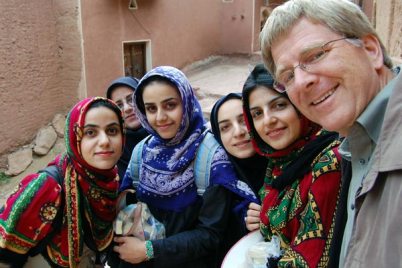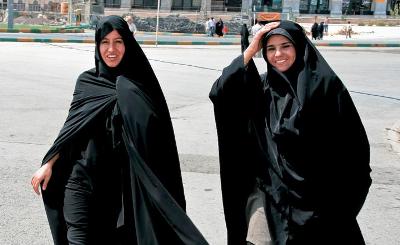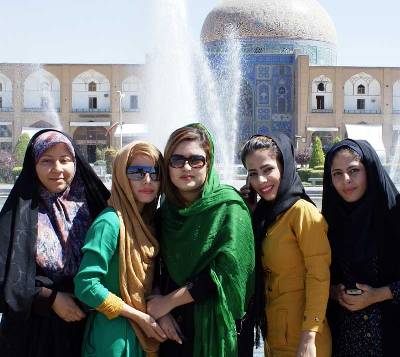Iran tourism for women: Safe or not safe?
Iran tourism for women: Safe or not safe?
By: Justine Oliver
 |
With sanctions relaxed on Iran and airlines including British Airways reintroducing direct flights to Tehran, Iran is attracting foreign companies and travelers again. Having just returned from a one-month self-drive tour of the country, I can assure you that the destination has a lot to offer.
Justine Oliver is an independent travel security specialist with comprehensive global expertise that specializes in solo female travel. For 16 years she has been advising multinationals, NGOs, media organizations, educational institutions, companies and individuals on how to operate abroad safely. From 2001 to 2015, Justine worked at Control Risks and then as a joint venture between Control Risks and International SOS in London, providing customers across the globe with all aspects of rice safety, incident and crisis management, business continuity and security .During this time, Justine regularly provided training for customers who worked abroad or sent new travelers and ex-patrons to unfamiliar surroundings. It conducts training sessions, both through the webinar and reciprocal, to individuals and groups across Europe. Before she specialized in travel security, Justine lived in Hong Kong for four years, where she worked in development for the Hong Kong Cancer Fund.When leaving Southeast Asia, Justine, instead of flying home, decided to return a 30-foot sailboat with her future husband to London for ten months. During this time, honored their writings by documenting their journey and their resulting articles were serialized in Yachting Monthly. Justine has traveled and worked in more than 58 countries and has just returned from a five month trip with her husband and two children who are returning a landrover from 1957 to Iran and back. Justine holds a degree in Combined Studies from Newcastle University. She currently lives in South-West France.
Business, culture, history, landscape, food and the people are just some of the compelling reasons to travel to Iran, but one of the main barriers to visit the country for many people is often their colleagues and friends asking ” It really safe travel?
Western media often portray Iran as negative. There is a widespread misunderstanding about the true nature and security of the country spoiled by the reputation of some of its politically unstable neighbors.
That’s why people are often stunned when they are told Iran, with the exception of a few locations, is considered a low-risk country and a safe destination to visit.
As a travel security consultant, specialising in women travellers, here are my top 10 tips to ensure visitors have a safe and fascinating trip to Iran.
CRIME
 |
Crime rates are low in Iran and many women travel to the country alone without any problems. As with traveling to any destination, you should always basic, healthy people understand precautions, such as do not visit isolated places after dark or find yourself alone with men you do not know. The rates of small crimes such as pocket tears and pick pockets are far lower than in Western countries and serious crime against foreigners is even rarer.
CULTURAL DIFFERENCES
The main danger for women traveling is the foul of cultural feelings. The country is Islamic and as a woman you are limited in terms of your clothes and behavior. The risks for women are twofold; The religious authorities and the male attention unintentionally. The latter is much less likely than in other Muslim countries such as Egypt and Pakistan, where it is not uncommon to be bothered by unwanted male attention. Iranians are incredibly friendly and welcoming, but are also very respectful of your personal space. They are extremely unlikely to be hit in Iran.
It is considered very rude to approach a woman without being invited. They can also be gazed at by men and women, but this is probably due to genuine curiosity and excitement that you visit their country. If you are friends in Iran you will surely be like the Iranians are some of the friendliest people on earth, you have to be careful to make Western style look contact with men in the group as you will feel them uncomfortable or worse Can your eye contact as To accept an invitation. Wearing sunglasses can help avoid inadvertently avoid contact with people you are not talking with. Touching, tapping on the back, shaking hands with men and other physical contact is not advisable.
CLOTHING
 |
The religious authorities are a threat to women traveling, and it is very important to stick to the strict dress code by wearing the hijab. The word hijab can mean both headscarf and “modest clothing,” but in Iran it means that your hair and body should be totally covered and your upper body should not be too close and should be low enough to cover your bottom.
Iranian women are in two groups with more religious women tend to wear the “Chador” meaning “tent”, an informal black dress that covers their entire body. The other group is wearing bright colors, and usually a “manteau”, or thigh-length, lightweight jacket over jeans. Examination of the limits of the permissible seems to be an Iranian sport, especially in Tehran, but the Islamic police patrol the streets and attract people into inappropriate clothes.
Each city seems to have different standards and in more religious cities like Qom you will not feel comfortable in your colorful Manteau and want to wear nude, loosely fitting black clothes and socks when you wear sandals.
COVERING YOUR HAIR
Nobody hides her face Iran, but every woman before puberty must cover her hair and décolleté. In reality, every city and city follows these rules more or less. In Tehran, you see some women with most of their hair uncovered and their heads only attached to the back of their heads, while in Tabriz, no one will show any hair. Take some hairpins to help keep your veil in place and be sure to leave every time you leave your hotel room and leave your hotel room for breakfast.
EATING AND DRINKING
 |
One of the things women do not travel on their own is eating alone. Iranians are so friendly and cheerful that it is unlikely that you have to endure a lot of lonely food. Because of social constraints, men are unlikely to approach you, but it is very likely that Iranian women, in groups or with their family, invite you to dine with them. Do not be surprised if they pay for your food, even if you have refused to join them!
PUBLIC TRANSPORT AND GENDER SEPARATION
Public transport is safe to use but aside from the Tehran Metro, it is probably not the ideal mode of transport for a business traveller.
The Tehran Metro is cheap, clean, air-conditioned and easy to navigate. At the front and back of each train are women wagons. These were implemented for gentleman’s reasons instead of sexist or discriminatory and can provide a less crowded and more comfortable experience, especially during the rush hour crush in the central carriages. Women can have other carriages alone or with male colleagues.
TOILETS
Toilets are definitely a low point in what is otherwise a very demanding company. Surprisingly, they are not always separate. It is not uncommon to visit the bathroom in a restaurant to find out that you have to go through the toilets of the men to get to the women’s area. But there is always soap, for which one is most grateful!
ROAD TRAFFIC INCIDENTS
The main roads in Iran are very good quality, but the driving behavior is bad. Always check that your vehicle is working seat belts and sitting in the back. Drivers will try to drive as fast as possible; Ask them to slow down if you are concerned and feigned travel sickness if you make any progress.
